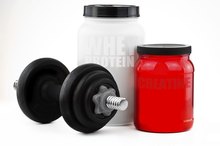Whey Protein & Soy Milk
For individuals who choose not to eat meat, or for professional bodybuilders trying to maximize their muscle gain, the question of where to get the necessary proteins is a very serious one. All proteins are made of the same compounds--amino acids arranged into branched chains--but the nutritional benefits of proteins can vary widely. Whey protein is found in cow's milk, but the proteins found in soy also have benefits.
Whey Protein
Whey protein is often sold in powdered form. It is extracted from cow's milk and dried out, preserving it for use in protein shakes. Whey protein is considered an excellent source of protein due to the multiple branched-chain amino acids 1. It is often marketed to bodybuilders and is among the most popular muscle-building supplements, also attractive to athletes because it is naturally occurring and poses no health risks.
- Whey protein is often sold in powdered form.
- It is extracted from cow's milk and dried out, preserving it for use in protein shakes.
Soy Milk
How to Use Whey Protein Pills
Learn More
Soy milk is produced from soybeans, a popular product used to replace animal products without robbing your body of necessary nutrients. According to NaturalNews.com, the proteins in soy also have some notable health benefits. Consuming the soy protein can help raise your body's HDL cholesterol levels--this is a healthy form of cholesterol that keeps your arteries and circulatory system healthy. It can also reduce the amount of protein excreted through the urine of those with type II diabetes, a common symptom of diabetic kidney disease.
- Soy milk is produced from soybeans, a popular product used to replace animal products without robbing your body of necessary nutrients.
- Consuming the soy protein can help raise your body's HDL cholesterol levels--this is a healthy form of cholesterol that keeps your arteries and circulatory system healthy.
Nutritional Needs
The body needs protein not only to build muscle, but also to build and maintain your hair follicles and keep your skin elastic and healthy. Whey protein need not be used to satisfy this nutritional need, but soy milk may need to be supplemented by beans, nuts and other products containing protein to provide your body with all its protein needs. A typical adult needs about 45 to 50 grams of protein daily in their diet, although this can vary based on weight, gender and activity level.
Whey Vs. Soy
Health Benefits of Body Fortress Super Advanced Whey Protein
Learn More
Whey protein is packed with protein, but if you aren't trying to add muscle bulk, there may not be any benefit to using it as a supplement. Still, some people use it as a food source and make smaller amounts of the protein shake to supplement meals and increase satiety. Since whey is extracted from cow's milk, vegans will still prefer soy. In terms of overall and cardiovascular health, soy milk is preferable to whey.
- Whey protein is packed with protein, but if you aren't trying to add muscle bulk, there may not be any benefit to using it as a supplement.
- Since whey is extracted from cow's milk, vegans will still prefer soy.
Considerations
An alternative to using either soy milk and whey protein is to use them both--by mixing whey protein powder into a soy milk shake, you can eat a high-protein diet that also features the health benefits and proteins found in soy milk. However, you should be aware that excessive protein consumption can force the body to convert proteins into fats for storage.
Related Articles
References
- Gilbert, J.-A., Bendsen, N. T., Tremblay, A., & Astrup, A. (2011). Effect of proteins from different sources on body composition. Nutrition, Metabolism and Cardiovascular Diseases, 21, B16–B31. DOI: 10.1016/j.numecd.2010.12.008.
- Hulmi, J. J., Lockwood, C. M., & Stout, J. R. (2010). Effect of protein/essential amino acids and resistance training on skeletal muscle hypertrophy: A case for whey protein. Nutrition & Metabolism, 7(1), 51. DOI: 10.1186/1743-7075-7-51.
- Ridge, A., Devine, A., Lyons-wall, P., Conlon, J., & Lo, J. (2018). The impact of whey protein supplementation in older adults on nutrient intakes and satiety over an 11-week exercise intervention. Food Quality and Preference, 68, 72–79. DOI: 10.1016/j.foodqual.2018.01.013.
- Tahavorgar, A., Vafa, M., Shidfar, F., Gohari, M., & Heydari, I. (2014). Whey protein preloads are more beneficial than soy protein preloads in regulating appetite, calorie intake, anthropometry, and body composition of overweight and obese men. Nutrition Research, 34(10), 856–861. DOI: 10.1016/j.nutres.2014.08.015.
- Thomas, D. T., Erdman, K. A., & Burke, L. M. (2016). Position of the Academy of Nutrition and Dietetics, Dietitians of Canada, and the American College of Sports Medicine: Nutrition and Athletic Performance. Journal of the Academy of Nutrition and Dietetics, 116(3), 501–528. DOI: 10.1016/j.jand.2015.12.006.
- Zhu, K., Kerr, D. A., Meng, X., Devine, A., Solah, V., Binns, C. W., & Prince, R. L. (2015). Two-Year Whey Protein Supplementation Did Not Enhance Muscle Mass and Physical Function in Well-Nourished Healthy Older Postmenopausal Women. The Journal of Nutrition, 145(11), 2520–2526. DOI: 10.3945/jn.115.218297.
Writer Bio
Jonathan Croswell has spent more than five years writing and editing for a number of newspapers and online publications, including the "Omaha World-Herald" and "New York Newsday." Croswell received a Bachelor of Arts degree in English from the University of Nebraska and is currently pursuing a Master's of Health and Exercise Science at Portland State University.









